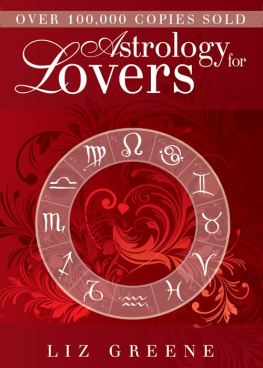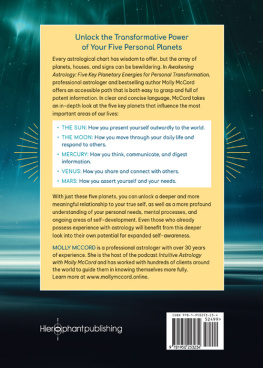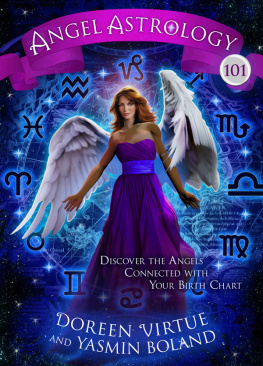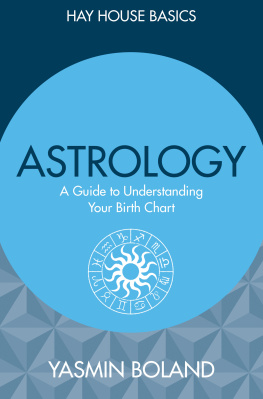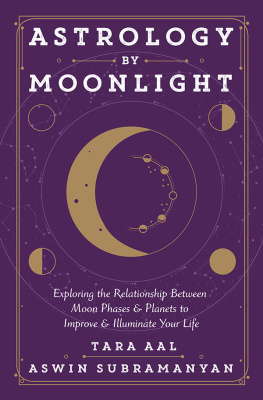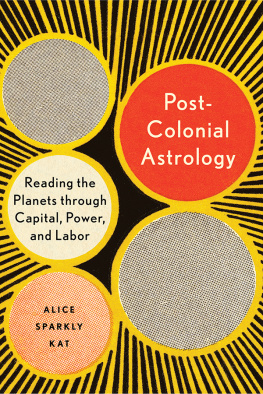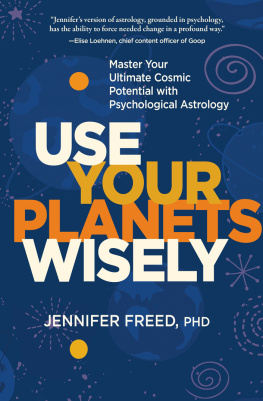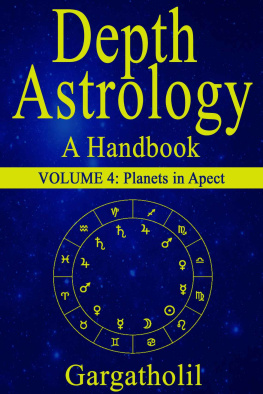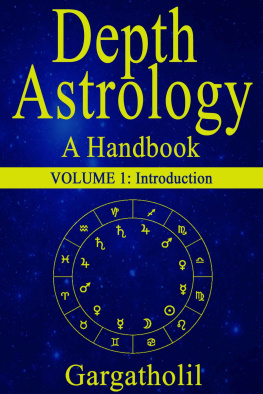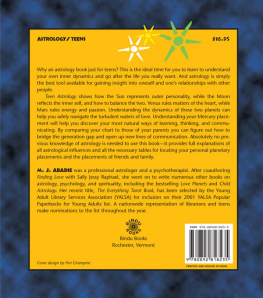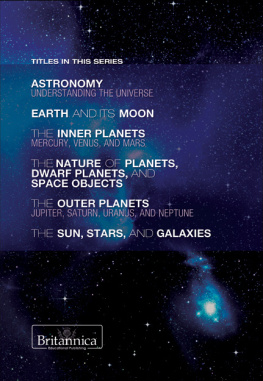
To Howard, in loving memory
19481992
First published in 1993 by
Samuel Weiser, Inc.
P. O. Box 612
York Beach, ME 03910-0612
www.weiserbooks.com
09 08 07 06 05 04 03 02 01 00
13 12 11 10 9 8 7 6 5
Copyright 1993 Liz Greene and Howard Sasportas
All rights reserved. No part of this publication may be reproduced or transmitted in any form or by any means, electronic or mechanical, including photocopy, without permission in writing from Samuel Weiser, Inc.
Reviewers may quote brief passages.
Library of Congress Cataloging-in-Publication Data Greene, Liz.
The inner planets : building blocks of personal reality / by Liz Greene & Howard Sasportas.
p. cm. --(Seminars in psychological astrology : v. 4)
1. Astrology. 2. Inner planets--Miscellanea.
3. Individual differences--Miscellanea.
I. Sasportas, Howard. II. Title. III. Series
BF1724.G74 1993
133.5'3--dc20
91-34557
CIP
ISBN 0-87728-741-4
BJ
Cover illustration is The Birth of Venus by Odilon Redon, Paris, Petit Palais. Giraudon Art Resource, NY. Used by kind permission.
Printed in the United States of America
The paper used in this publication meets the minimum requirements of the American National Standard for Information SciencePermanence of Paper for Printed Library Materials Z39.48-1992 (R1997).
www.redwheelweiser.com
www.redwheelweiser.com/newsletter
CONTENTS
by Charles Harvey
by Howard Sasportas
by Howard Sasportas
by Liz Greene
by Howard Sasportas
by Liz Greene
by Liz Greene
by Howard Sasportas
by Liz Greene and Howard Sasportas
PREFACE
At the bar of history, contemporary judgements seldom prove reliable. Yet if one can be certain of anything it must be that Howard Sasportas will feature prominently in any list of the key figures involved in the reemergence of astrology as a major formative force in Western culture. It is no small tribute to the impact of the man and his work that at his death in London, England, at 17:11 BST, May 12, 1992 (as Pluto crossed his MC and the Sun his IC), Howard Sasportas became the very first astrologer in the history of the British Press to be honoured by a full length obituary. On the day of his funeral, this appeared on the Gazette page of The Independent, complete with his smiling face. It was published alongside the Court Circular together with celebrations of the lives of two other outstanding souls: Marshal Nie Rongzhen, the last of Mao Tse-Tung's generals, and Sylvia Syms, described by Frank Sinatra as the world's greatest saloon singer; a juxtaposition of diverse human greatness that Howard's Venus in Gemini humour and his Mars with Saturn and Pluto in Leo aspirations would have richly appreciated.
Howard's claim to fame and honour-beyond the relatively closed world of professional astrologylies in the very fact that he was not content to let astrology blush unseen, unused and unconsidered by the larger world. He was determined to put astrology on the map of human consciousness in the service of humanity, and for the self-realization of individual souls. He was to give himself totally to this task with a zest, vitality, courage, wit, love, compassion, and wisdom that none who met him will ever forget. That today around the world a growing number of psychologists, therapists, counsellors, and others in the helping professions take astrology seriously as a diagnostic and therapeutic tool is in no small measure due to the labours, enthusiasm, and concern of Howard Sasportas.
In this work, Howard's pivotal achievement was his visionary founding, together with Liz Greene, of the Centre for Psychological Astrology, at the time of the Saturn-Pluto and Jupiter-Uranus conjunctions of 1983. Their centre set out a rigorous professional training program designed to cross-fertilise the fields of astrology and depth, humanistic, and transpersonal psychology, with students being expected to undergo their own personal therapy as an integral part of their training (for further details, see About the Centre, p. 330). From the outset, the curriculum also included a deep concern with mythology and the study of the principles of kabbala and the tarot. With this potent combination, Howard and Liz created a crucial aquaduct between the rivers of depth and height psychology and the already swelling stream of renascent astrology. The riches that have flowed from and through this confluence are now apparent for all to see. Under Howard and Liz's inspired direction, the Centre for Psychological Astrology has gone from strength to strength, attracting to it some of the finest and most enquiring and imaginative minds in both fields. In the process it has generated directly, and indirectly, an incomparable wealth of astro-psychological literature, one precious volume of which you are now holding.
The present transcripts, like the three preceding volumes in this Seminars series, give a taste of the breadth and depth of understanding that Howard brought to his work as a teacher, and the fiery vitality and enthusiasm of his presentations and dialogues with the Centre's students. As always, here we see his probing, lively, intuitive mind ever eager to bring out the inner life of the planetary gods, bringing new and profound insights to the commonplaces of astrology, and yet at one and the same time educing and drawing out the students' own inner understanding.
So where, we may ask, was Howard coming from? He was born in Hartford, Connecticut, USA at 1.46 A.M. EST on April 12, 1948. Students will find endless instruction in the contemplation of his birth chart with the sheer power and vitality of all of its Fire and Earth which he lived and enjoyed to the full as pioneer, consolida-tor, and nourisher. But, as always, we can learn much from placing the man and his chart in its family context. Howard's parents, Max and Edith Sasportas, were from a long line of devout orthodox Sephardic Jews; and though he was later to become open to all dimensions of the spiritual life, these primary roots were undoubtedly of great significance to him. The Sephardim, the Jews of Spain, have always been noted for their cultural and intellectual achievements, and some, like Maimonides (11351204), played central parts in the return of the ancient wisdom tradition to Europe. It was, for example, Arab and Sephardic Jewish astronomer-astrologers who were engaged by Alfonso X of Spain in the 1250s to prepare the Alfonsine Tables of planetary movement that were so crucial to the development of astrology in Europe. When the Jews were expelled from Spain in 1492, they dispersed throughout Europe and North Africa. One of these Sephardim, Jacob Sasportas (born in Oran, Morocco 1610, died 1698), a direct ancestor of Howard's, was to become London's first Rabbi in 1664. The Sasportases later moved on to Amsterdam and, in due course, to the USA.
Whether it was consciously or unconsciously, this great creative Sephardic tradition undoubtedly informed an important level of Howard's life. In 1973, Howard moved to London, England, perhaps subliminally drawn back to Europe by these ancient and illustrious roots. Here he was soon to become involved in the emerging astrology movement that was focused around the independent Faculty of Astrological Studies. The FAS had been founded in London in 1948 by the great Charles Carter, Edmund Casselli, Margaret Hone, and Lorenz von Sommaruga for the purpose of advancing the understanding of the astrological tradition and producing practicing astrologers of integrity. In 1979, Sasportas was awarded the Gold Medal for the Faculty of Astrological Studies' Diploma Exam, its highest honour, and the same year became a tutor for the Faculty and began to establish himself as an immensely popular teacher and speaker there and with the Astrological Association.
Next page


